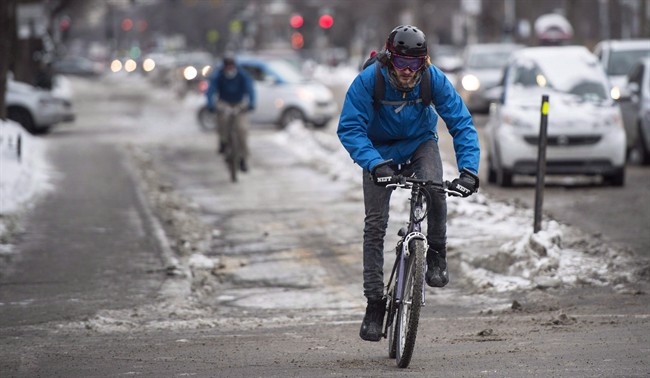Springtime in Montreal is synonymous with terrasses, flowers and cyclists, but this year bike lovers will be in for a nasty surprise when the updated Highway Safety Code comes into law.

Cyclist groups and the city’s new bike-friendly administration are criticizing a provincial bill that ups fines by over 400 per cent for seemingly mild violations such as not having enough reflectors on pedals.
“We are pretty disappointed in this bill,” said city councillor Marianne Giguère, who is heavily involved in Montreal’s cycling projects.
Cycling politics are big in Montreal and the city prides itself on its 850 kilometres of bike lanes, half of which are maintained in the winter.
READ MORE: More than 1 million Montreal cyclists on the road
While Montreal is upset about the new road rules, the changes aren’t all bad, the city says.
Quebec agreed with Montreal’s suggestion to allow cyclists to cross a road when the pedestrian light signal is on. Moreover, the province accepted to end the practice of removing points on someone’s driver’s license when they are caught burning red lights on a bike.
But Quebec refused to allow bikers to turn right on a red light, or to use the so-called “Idaho stop,” meaning a cyclist can treat a stop sign as a yield, and slow down before crossing rather than making a full stop and putting a foot on the ground.

Get breaking National news
READ MORE: Plante administration says cyclists should be allowed to do rolling stops, turn right on red
There is no logic to treating cyclists the same way as car drivers, Giguère said.
“I think it scares the authorities in (Quebec City) to give the impression they are favouring cyclists over drivers,” she said.
Cyclists who break the road law currently face fines between $15 and $30. With the adoption of the new rules, they will be liable for fines from $80 to $100 — a 433 per cent increase.
“It’s a staggering increase,” Giguère said.
Magali Bebronne, a spokeswoman for Vélo Québec, a large cyclist advocacy group in the province, said increasing fines by more than 400 per cent and refusing to relax the laws for bikers is “illogical and exaggerated.”
But the future for cyclists in Montreal is bright, she said.
WATCH: Montreal starts electric bike pilot project

The city administration is on her side, and Mayor Valerie Plante has promised to make cycling downtown more attractive and bike lanes better protected from drivers.
Plante has already shown she is willing to take controversial and strong decisions to limit the use of cars in the city. Her administration is cutting off cars from using a road on top of the city’s iconic Mount Royal Park to drive across the mountain.
The decision sparked fierce opposition but she held her ground, and the pilot project is set to begin in a few weeks.
READ MORE: A timeline of what’s to come for Camillien Houde Way
Montreal was a North American pioneer for urban biking but has seen cities around the world overtake it in terms of cycling infrastructure and bold new ideas that prioritize bicycles in densely populated areas.
Giguère said Montreal has catching up to do and is willing to make the necessary investments — and controversial decisions.







Comments